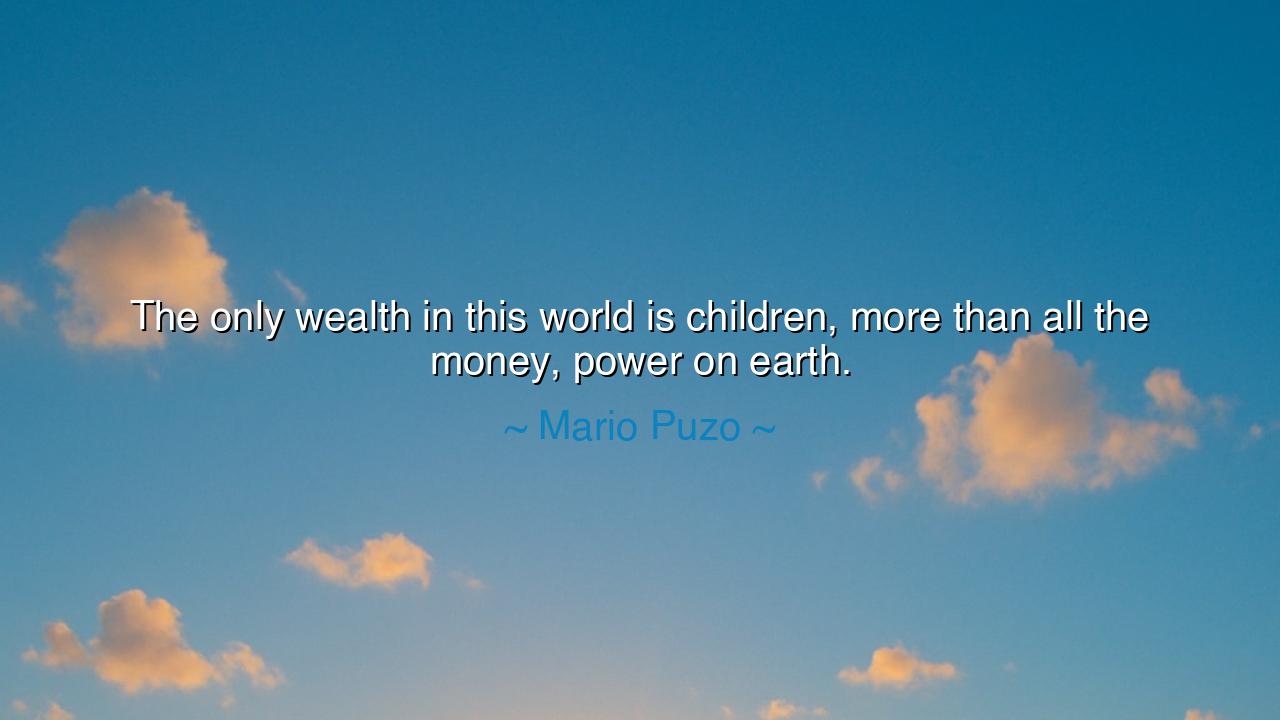
The only wealth in this world is children, more than all the






Hearken, O children of the ages, to the enduring words of Mario Puzo, who proclaims that the true treasure of this world is neither money, nor power, nor earthly dominion, but the precious gift of children. He teaches that they are the living heirs of hope, the carriers of legacy, and the embodiment of continuity beyond the fleeting glories of wealth and authority. In their laughter, learning, and growth lies a richness that cannot be measured by coin or crowned in title.
Puzo reminds us that worldly power and wealth are transient; empires crumble, fortunes fade, and influence is but a shadow when compared to the vitality and promise of children. They are the vessels of potential, the seeds from which civilizations bloom, and the living testament to love, care, and moral guidance. To nurture them is to cultivate wealth that endures across generations, far beyond the grasp of kings and merchants.
Consider the example of Abraham Lincoln, who, though burdened with the weight of nation and war, treasured the guidance and presence of his family. He understood that the ultimate wealth of life is not in command or conquest, but in the fostering of young minds and hearts, in the transmission of values, wisdom, and courage to those who will inherit the future. His legacy lives on not merely in law or history, but in the inspiration he passed to generations.
Even in humble lives, the principle holds. The parent who teaches, protects, and encourages, the teacher who inspires curiosity and character, and the mentor who cultivates promise in the young all recognize the profound wealth carried in the next generation. In every child lies the hope, the ingenuity, and the spirit to remake the world in ways richer than any treasure or throne.
O children of the future, carry this teaching in your hearts: cherish the young, invest in their growth, and honor their presence as the truest wealth. Let your deeds preserve their well-being, let your words nurture their understanding, and let your love guide their steps. For in children, life itself renews, and the riches of the soul far surpass the fleeting treasures of money and worldly power.
If you desire, I can also craft a visual, ancient scroll-style presentation of this passage to capture the heroic, timeless, and deeply evocative essence of Puzo’s teaching on children, legacy, and the enduring wealth of life.






VA1. Nguyen Thi Van An
This statement encourages reflection on priorities and legacy. How much of our energy should be devoted to nurturing the next generation compared to accumulating money or power? Does framing children as the ultimate wealth suggest that personal and societal growth is best measured through care, education, and guidance rather than material accumulation? I also wonder how this idea resonates across different social and economic realities, where raising children can be both a privilege and a challenge.
QGNguyen Ngoc Quynh Giao
I find this perspective deeply humanistic, but it raises questions about universality. Are children the only form of true wealth, or can other relationships, achievements, or contributions hold similar value? How do personal experiences and cultural contexts shape our understanding of wealth beyond material possessions? I’m also curious whether emphasizing children as wealth could inadvertently pressure individuals or limit the recognition of other meaningful aspects of life.
PTPham Tran Phuong Tuyen
This quote prompts me to think about intergenerational responsibility. If children are our greatest wealth, how should society structure education, healthcare, and social systems to reflect this value? Does treating children as central to human wealth challenge individualistic notions of success, and how might this influence policies on family support, parental leave, and community investment in youth?
THDo Thanh Huyen
Reading this, I feel a tension between societal definitions of success and personal fulfillment. How does valuing children as the ultimate wealth reshape priorities, particularly in cultures that emphasize money and power? Could this viewpoint encourage a deeper investment in nurturing future generations rather than chasing external symbols of success? I also wonder about the implications for people who cannot or choose not to have children.
AHDang Anh Hao
This statement makes me reflect on the meaning of wealth and legacy. Can children truly be considered the greatest form of wealth because they carry forward values, love, and continuity of life? I also wonder how this perspective balances with the practical responsibilities of raising children, and whether emotional and relational richness outweighs material success in creating lasting fulfillment.